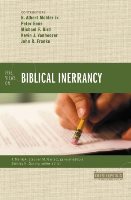About the Editors
J. Merrick is Assistant Professor of Theology at Grand Canyon University.
Stephen M. Garrett is an associate professor of Public Theology and the Philosophy of Religion in the Social Communications Institute at the Lithuanian University of Educational Sciences.
About the Contributors
Michael F. Bird is Lecturer in Theology at Ridley Melbourne Ministry and Mission College, and Honorary Research Associate at the University of Queensland in Australia.
Peter E. Enns teaches as Eastern University.
John Franke is Professor of Missional Theology at Yellowstone Theological Institute.
R.Albert Mohler Jr. is president of The Southern Baptist Theological Seminary.
Kevin J. Vanhoozer is Research Professor of Systematic Theology at Trinity Evangelical Divinity School.
Overview
Five Views on Biblical Inerrancy is another installment in Zondervan’s “Counterpoints” series. Five differing views from self-professing evangelicals on the question of “inerrancy” are presented. Each contributor writes an essay in defense of their view followed by brief responses from the other contributors.
Table of Contents
Introduction
- When the Bible Speaks, God Speaks: The Classic Doctrine of Biblical Inerrancy (R. Albert Mohler)
Responses from other contributors
- Inerrancy, However Defined, Does not Describe What the Bible Does (Peter Enns)
Responses from other contributors
- Inerrancy is not Necessary for Evangelicalism Outside the USA (Michael F. Bird)
Responses from other contributors
- Augustinian Inerrancy: Literary Meaning, Literal Truth, and Literate Interpretation in the Economy of Biblical Discourse (Kevin J. Vanhoozer)
Responses from other contributors
- Recasting Inerrancy: The Bible as Witness to Missional Plurality (John R. Franke)
Responses from other contributors
Conclusion
Summary
Chapter 1: When the Bible Speaks, God Speaks: The Classic Doctrine of Biblical Inerrancy (R. Albert Mohler)
The Case for Inerrancy
For Mohler, the definitions of inerrancy as expressed in the Chicago Statement on Biblical Inerrancy (CSBI) is an intellectually satisfying and pastorally appropriate milestone that has yet to be surpassed. Three lines of argument buttress Mohler’s definition of inerrancy. The first of these is: Inerrancy and the Bible’s testimony to itself. Mohler cites many classic texts that demonstrate the Bible’s own high view of itself as God’s own words. The Bible routinely conflates God’s voice with the human authors of Scripture. At no point, Mohler argues, do the Scriptures suggest that the “Word of God” is to be found or extracted from the data of Scripture.
[To continue reading this summary, please see below....]The remainder of this article is premium content. Become a member to continue reading.
Already have an account? Sign In
